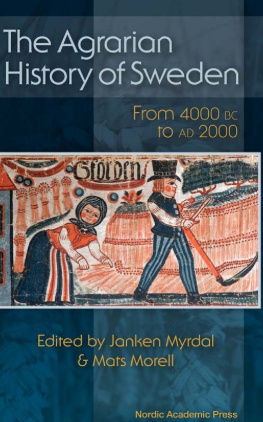Copyright 2014 Henrik O. Lunde
Cataloging-in-publication data is available from the Library of Congress and the British Library.
All rights reserved. No part of this book may be reproduced or transmitted in any form or by any means, electronic or mechanical including photocopying, recording or by any information storage and retrieval system, without permission from the Publisher in writing.
Printed and bound in the United States of America.
Dr. Enoch J. Haga
Preface and Acknowledgments Magnanimity in politics is not seldom the truest wisdom, and a great empire and little minds go ill together. EDMUND BURKE |
A s a 1314-year old student in Norway I first read Edward Gibbons The Decline and Fall of the Roman Empire as a special assignment. I found this 225-year-old work (published between 1776 and 1788) as fascinating then as I did recently when I read it again.
I have two reasons for writing this book. First, throughout my life I have wondered if the elements that Gibbon identified in the decline of Rome would be equally pertinent in our times. In this work I make an initial attempt to answer my own questions, particularly as they apply to my former profession as a military planner and practitioner. Some elements in the rise of a power are obvious, such as size, population, and resources, but others are more difficult to identify.
Sweden is a good place to begin because in many ways Sweden breaks the commonly perceived mold when we talk about national and military power. Factoring in Finland and Swedens holdings along the eastern shores of the Baltic, Sweden had something like 1.31.5 million inhabitants at the time it intervened in the Thirty Years War. There was virtually no industrial base except for mining; the country was a poor agrarian society. Nevertheless, Sweden was able to defeat powers or combinations of powers with more than ten times her population and with much greater resources.
It is important to get some terms and definitions out of the way at the very outset. I look upon national power as the aggregate capacity of a state to achieve its national interests and to influence the behavior of other states. This definition involves several distinct yet interrelated elementspopulation, geography, economics, technology, socio-psychological, and military. The focus of this book is on the military element, but since all elements of national power are interrelated it is impossible to deal in a meaningful way with just one to the exclusion of all others.
The unlikely rise and decline of Sweden as the pre-eminent European military power in the 17th and 18th centuries comprises a neglected aspect of military history, and thus is my second reason for writing this book. My hope is to partially fill the gap that exists in the military historiography for central, eastern, and northern Europe during this period.
Covering a period of more than 100 years, it is an exceedingly complicated and confusing time in European history when the political map of Europe looked much different than today. With respect to the Thirty Years War (1618-1648) Professor Peter H. Wilson (who wrote the latest comprehensive history in English in 2009) makes the following observation in his preface:
The history of the Thirty Years War is rich in specialist studies, but poor in general accounts. Few authors provide more than short overviews intended for students. It is easy to see why. To cover all aspects would require knowledge of at least fourteen European languages, while there are sufficient archival records to occupy many lifetimes of research. Even the printed material runs to millions of pages; there are over 4,000 titles just on the Peace of Westphalia that concluded the conflict.
I have found that Professor Wilson is exactly right as far as military history is concerned. B.H. Liddell Hart reached a similar conclusion in 1929 when he wrote:
Considering that he [Gustav Adolf] stands on the threshold of the modern world the dearth of military studies of him in this country [England] is remarkable, the more so that the epoch of transition in which he lived is so well known and widely studied in its political and religious aspects.
The last book I know about in English with the military history of the Thirty Years War as its prime focus was written by Trevor N. Dupuy in 1969. He deplores Anglo-Saxon insularity when he writes:
There is perhaps no more striking example of this insularity than the lack of attention that has been paid in the English literature of political and military history to the impact of Gustavus Adolphus in his time, and on subsequent eras.
This is especially true considering that the period under study was one of revolutionary changes in weaponry and tactics, many of Gustav Adolfs making, and which led to modern war as we know it.
There are a number of good books in German on military operations during this period. Surprisingly, there are few recently in Swedish, where the military is for the most part covered as just one element of general histories of the war.
The Thirty Years War became the benchmark for measuring all later wars. In his radio broadcast on 4 May 1945, Hitlers armament minister, Albert Speer, announced that the the destruction that has been inflicted on Germany can only be compared to that of the Thirty Years War. The decimation of our people through hunger and deprivation must not be allowed to reach the proportion of that epoch. Public opinion surveys carried out in the 1960s revealed that Germans placed the Thirty Years War as their countrys greatest disaster, ahead of the world wars, the Holocaust, and the Black Death.
Even in the twenty-first century German authors assert that never before and also never since, not even during the horrors of the bombing during the Second World War, was the land so devastated and the people so tortured as between 1618 and 1648.
If we fast-forward to the Great Nordic War (17001721), which brought the Swedish Empire into virtual collapse, we find a similar problem in historiography. There exist enormous numbers of archival records and again we find millions of pages dealing not only with that war but also with the wars between 1648 and 1700, but very little in English. Military operations are again normally covered among other subjects. The lack of adequate coverage in English of this important war is difficult to understand. It took place at the same time as The War of the Spanish Succession and is completely over-shadowed by that event in the military literature. It can be argued persuasively that the outcome of the Great Nordic War was of greater importance than The War of the Spanish Succession since it led directly to the rise of Russia and Prussia, with enormous consequences for the history of the world.










